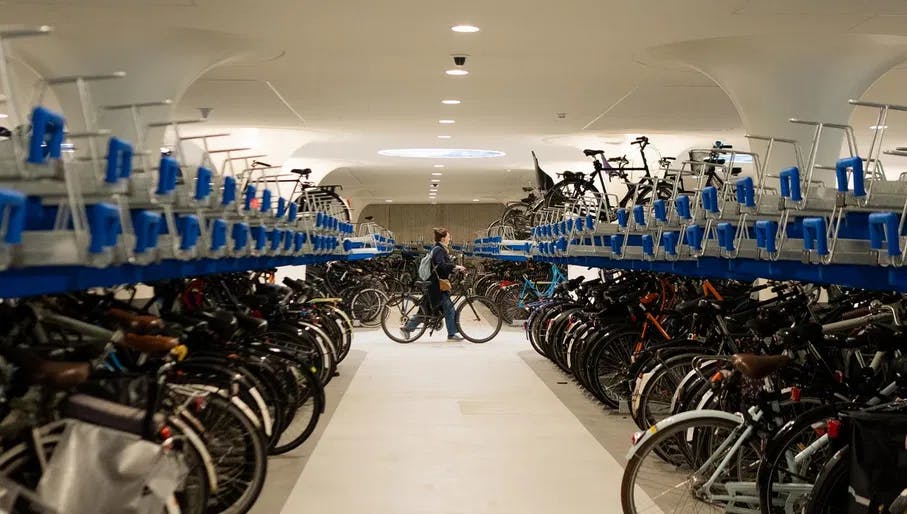
Mapping Amsterdam’s smart mobility projects
MRA-platform Smart Mobility

When you first think of smart mobility, shared initiatives may come to mind. But real change requires collaboration between governments, businesses, and knowledge institutions - which is where MRA-platform Smart Mobility comes in. As a regional driver in Amsterdam, it organises value sessions to make data accessible for governments and oval table logistics meetings to coordinate the most important research questions.
MRA-platform Smart Mobility played a key role in the XCARCITY research programme, supporting Amsterdam’s transition to sustainable mobility by developing digital tools and fostering stakeholder collaboration to enhance liveability and accessibility in the city.
EIT Urban Mobility: Innovation Hub Amsterdam

With cities at the heart of the climate crisis, transforming urban mobility is critical to achieving the European Green Deal targets of reducing emissions by 55% by 2030 and reaching net zero by 2050. While innovative transport solutions exist, their widespread adoption remains difficult.
From its Innovation Hub West in Amsterdam, EIT Urban Mobility is accelerating the shift to cleaner, more efficient transport across the Netherlands, Belgium, Ireland, Luxembourg, and the UK. By connecting startups, businesses, researchers, and policymakers, the hub helps deploy low-emission transport, expanded public transit, and improved cycling and walking infrastructure. Working closely with local and regional stakeholders, EIT Urban Mobility ensures that Amsterdam, and cities across Europe, lead the way in creating cleaner, more liveable urban spaces.
Roboat

Delivering goods in busy cities contributes to congestion and CO₂ emissions, straining urban infrastructure. Yet, waterways remain an underutilised resource for sustainable transport and logistics. Recognising this potential, Roboat emerged from a collaboration between AMS Institute and MIT as an ambitious research project exploring autonomous, electric boats as a solution.
Now an Amsterdam-based startup, Roboat has evolved into a pioneering force in self-navigating vessels capable of transporting goods and passengers and performing urban tasks - all without a captain. These vessels provide a safe, efficient, and low-impact alternative to road transport, helping cities embrace more sustainable urban transport logistics.
Buurthub 2.0

A growing smart mobility trend is replacing cars with bikes. And for longer trips, opting for an e-bike. But where to charge these bikes? Buurthub 2.0 is another project born out of AMS Institute that focuses on efficient charging solutions for private and shared electric bikes, while exploring methods to alleviate energy grid congestion.
The objectives of the hub are to develop state of the art charging solutions for both private and shared cargo bikes, as well as implementing wireless charging tech such as Tiler, to make charging bikes as easy and accessible as possible. Buurthub 2.0 acts as a place where logistical, societal and economical functions come together to best serve local communities.
Gemini Project

Not all smart mobility solutions will work for all cities. So how can you test which ones will work best for each place? This is where the Gemini project steps in. Based in Amsterdam, but part of a larger European Union funded project, its mission is to accelerate the transition to climate-neutral transport solutions.
The projects consist of 43 partners across 16 cities with Amsterdam being one of the 8 mobility ‘’living labs’’ piloting the ‘’Mobility as a Commons’’ (MaaC) model. The Maac Model aims to make shared mobility more inclusive and affordable. An example of the pilot is offering cooperative car-sharing permits at no extra cost including a parking spot. Through initiatives such as the Maac model, the Gemini Project aims to foster accessible, and community-driven mobility solutions, contributing not only to the climate goals of Amsterdam but across Europe as a whole.
The MetaCCAZE project

With the European Union focusing on electric vehicles as a way to cut transport-related greenhouse gases – the issue arises of where and how to efficiently charge vehicles without putting too much strain on the grid.
The MetaCCaze project aims to speed up the use of smart systems that use electric power, automation, and connections. To simplify and clean up urban transportation, the project focuses on automated EV charging, AI-driven route planning for self-driving fleets, and smart traffic management to reduce emissions and improve flow. This project is currently being tested in Amsterdam, Munich, Limassol, and Tampere and if successful will be transferred to Athens, Krakow, Gonzo, Milan, Miskolc and Paris.
Related articles

Meet the companies changing the game in smart mobility

Key facts on Amsterdam's mobility industry

How Amsterdam redefined urban mobility

About the mobility industry in Amsterdam

Meet the Witkar: the world’s first modern car sharing system

Amsterdam’s top energy startups to watch in 2024

Powering the future: Amsterdam’s rise as a renewable energy hub

Watermeln’s green hydrogen generator is electrifying the future

Schneider Electric: the world’s most sustainable company

